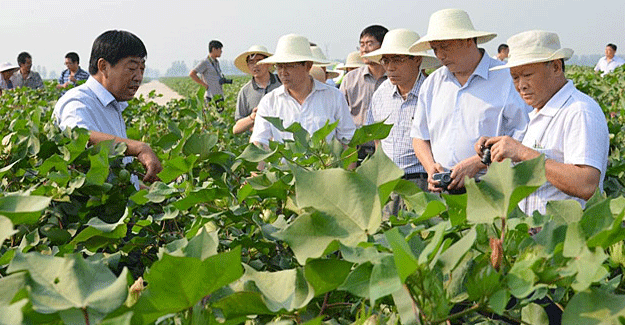
China takes the lead in cotton research
China is taking the lead in identification, testing, breeding and application of new cotton cultivar resistant against Verticillium Wilt. This was announced yesterday by an expert panel composed of academicians specialized in cotton. The move follows a review of the results of a project on Breeding and Application of Zhongzhi Cotton Cultivars against Verticillium Wilt. The project was jointly undertaken by the Institute of Agro-Products Processing Science and Technology and the Institute of Plant Protection under Chinese Academy of Agricultural Sciences (CAAS), and Nanjing Agricultural University.
The 26-year research confirmed the resistance of existing Chinese cotton cultivars against Verticillium Wilt, said the project leader, Dai Xiaofeng. Such resistance is scientifically proved to be qualitative inheritance, and the inherited character is produced by multiple genes. The marker that closely links to the resistant genes has been identified. Molecular marker helps a lot in the rapid and accurate identification of the resistance. The project team also pioneered in cotton resistant breeding method, i.e. combing the screen of disease nursery and molecular marker-assisted selection.
The new highly-resistant cultivar Zhongzhi Cotton 372 against Verticillium Wilt was used as maternal or paternal materials to cross with other cotton cultivars. As a result, a total of 128 resistance progenies were further screened, including cultivar Zhongzhi Cotton 2 which is Verticillium Wilt and Cotton Bollworm resistant, and Bacterial Blight-immune. Currently, China plants 3.72 million hectares of Zhongzhi cotton cultivars with resistance against Verticillium Wilt, generating RMB 12.3 billion of direct economic benefit.
Besides research on plant pathology and crop resistant breeding, the project serves as references to research on pest control for other crops. The project findings were disseminated to overseas research communities. Verticillium Wilt, caused by a soil-borne fungus, is a major cotton disease in China. Its pathogen can survive extremely long periods of time and accumulate in the soil. Due to aberrance rule of pathogen, no effective measures were developed for its control earlier. The disease may lead to 10-15% yield loss, and is known as the cotton “cancer”.
Textile Excellence
If you wish to Subscribe to Textile Excellence Print Edition, kindly fill in the below form and we shall get back to you with details.













